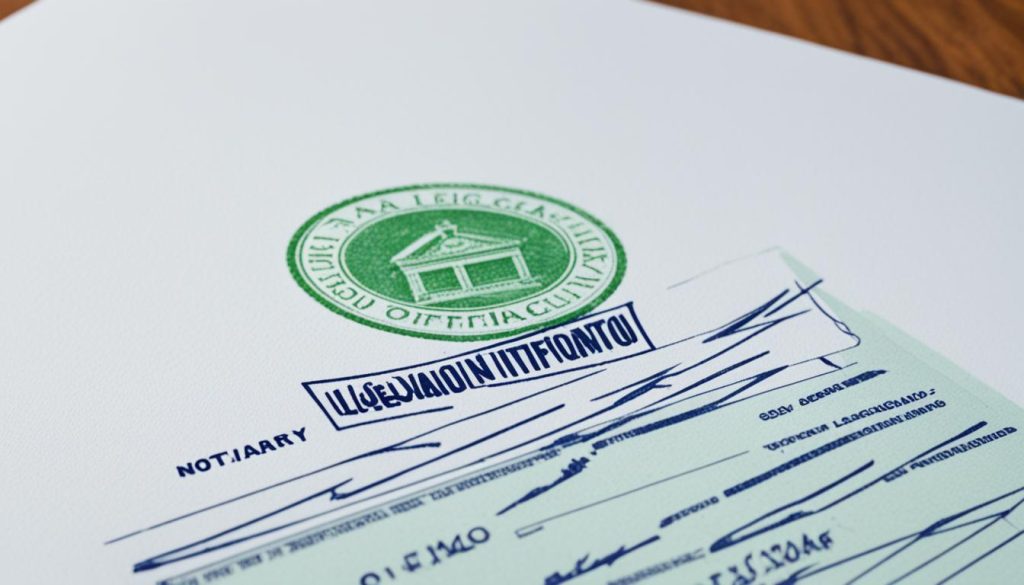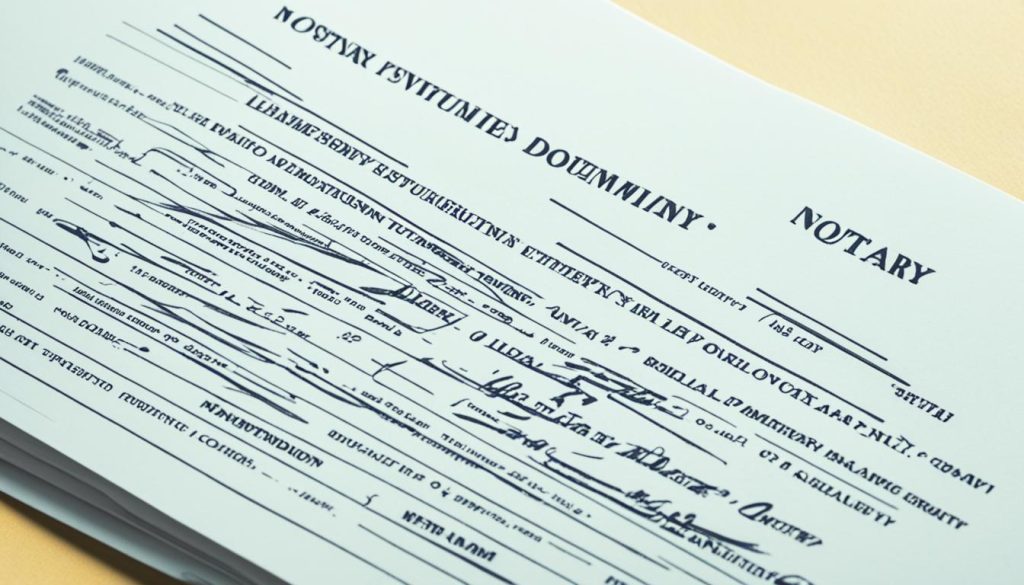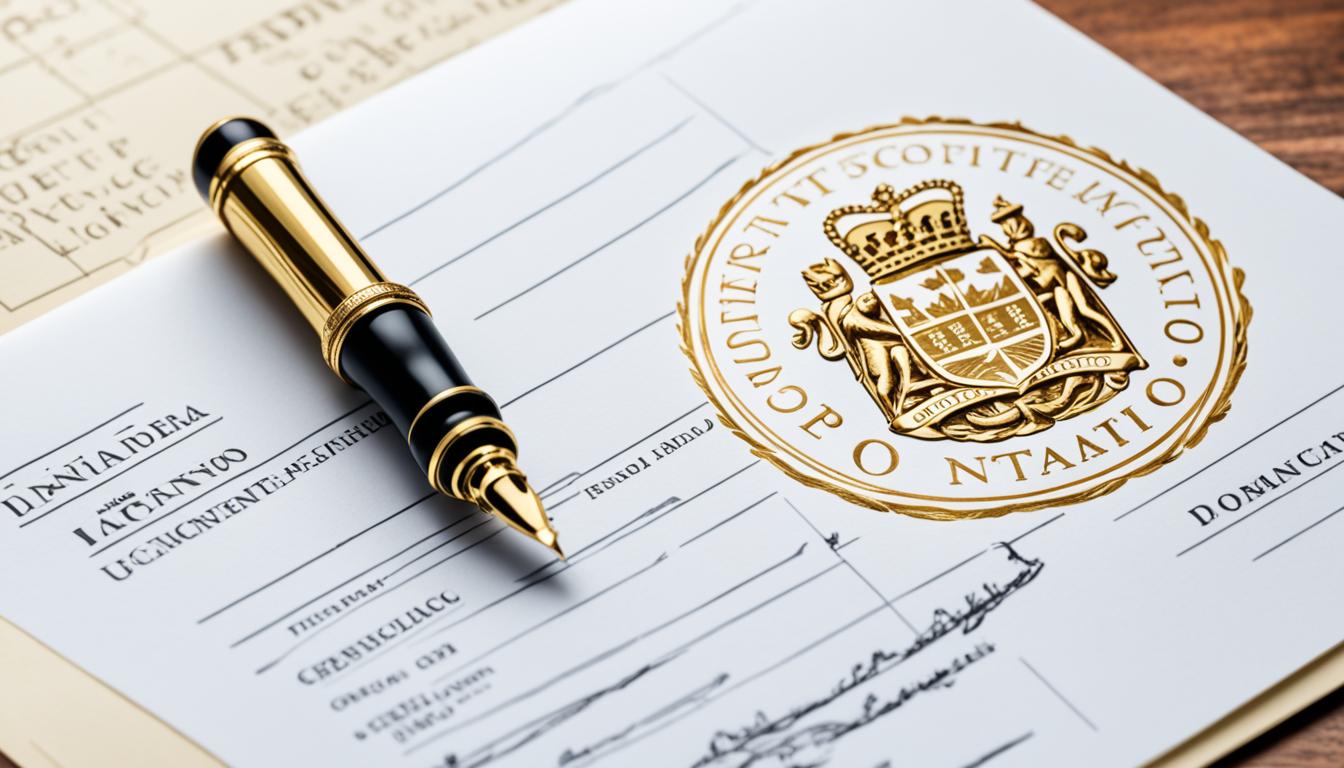If you’ve ever needed an important document notarized in Ontario, you probably know it can be a daunting task to navigate the various options and requirements. From finding a qualified individual to understanding the associated costs, the process can quickly become overwhelming. To help simplify things, we’ve put together this detailed guide to answer all of your questions about who can notarize a document in Ontario, including the role of banks and notary publics, and the cost involved. So, if you’re ready to demystify the notarization process in Ontario, keep reading!
What is a Notary Public?
In Ontario, a notary public is someone chosen by the government to handle certain legal tasks. They witness signatures, make sure signatories are who they say they are, and certify copies of documents as true.
Definition and Responsibilities
They are as powerful as Commissioners for Taking Affidavits. A notary public can also make sure documents are signed properly and are true copies. Their job helps make important documents legally valid and authentic, which is key for many transactions and legal events.
Qualifications and Appointment Process
To become a notary public in Ontario, you need to be a lawyer or paralegal. This is according to the Notaries Act. You also have to apply and be chosen by the government.

The Importance of Notarization
Notarization is crucial for the legal validity and authentication of legal document notarization ontario. A Notary Public checks the signer’s identity, witnesses the signing, and adds their seal and signature. This proves the document is real and the signer knew and agreed to its contents.
Legal Validity and Authentication
Notarization confirms the signer’s identity and ensures they sign willingly. It adds security and trust to documents. Thus, they’re more reliable in legal matters and transactions.
Use Cases for Notarized Documents
Notarized documents have many uses for notarized documents, such as:
- Real estate deals, like deeds, mortgages, and title changes
- Financial papers, for example, powers of attorney and loan agreements
- Business agreements, including partnership papers and leases
- Legal documents, like wills and sworn statements
- International transactions, needing notarization for global recognition
By making sure these documents are true, notarization protects everyone’s rights and interests involved.

Types of Documents Requiring Notarization
In Ontario, notarization plays a key role for many legal and business documents. This includes court papers, real estate deals, and financial records. A Notary Public’s service is necessary to make sure these documents are real and legally valid.
Legal and Court Documents
Affidavits, powers of attorney, and wills are some examples. They need notarization to be valid in court. This step checks the signer’s identity and confirms they understand the document.
Real Estate and Property Transactions
Real estate transactions are a common area where notarization is needed. Deeds, mortgages, and title changes fall under this category. Notarizing these documents helps to prevent fraud and protects everyone involved.
Financial and Business Documents
Contracts, agreements, and corporate decisions often need notarization too. This step checks the document’s validity and the signer’s right to sign. It’s crucial in business deals and financial matters.
| Type of Document | Notarization Requirement |
|---|---|
| Affidavits | Required for legal and court proceedings |
| Powers of Attorney | Required to grant legal authority to another person |
| Wills and Testaments | Required to ensure the validity and authenticity of the document |
| Property Deeds | Required for real estate transactions and transfers |
| Contracts and Agreements | May be required for certain business and financial transactions |

Who Can Notarize a Document in Ontario?
In Ontario, Notaries Public have the power to notarize documents. They get their authority from the provincial government through the Notaries Act. While not all lawyers and paralegals can do this, those who are Notaries Public can charge for notarizing documents.
Lawyers and Paralegals as Notaries Public
Lawyers and paralegals can become Notaries Public if they meet the needed qualifications. This means they can help certify the legality of documents for people and companies. These documents can include legal documents, real estate transactions, and financial agreements.
Eligibility and Appointment Requirements
To become a Notary Public in Ontario, lawyers and paralegals must be in good standing with the Law Society of Ontario. They also have to apply to the Ministry of the Attorney General. This application includes details about their professional history and qualifications. Notaries Public become official after a process that takes a few weeks. Then, they can start notarizing documents.

| Criteria | Requirement |
|---|---|
| Profession | Lawyers and paralegals in Ontario |
| Licensing | Must be in good standing with the Law Society of Ontario |
| Application Process | Submit an application to the Ministry of the Attorney General |
| Appointment Timeline | Typically takes several weeks to complete |
| Authorized Jurisdiction | Notaries Public can notarize documents within the province of Ontario |
Finding a Notary Public in Ontario
Looking for notary public help in Ontario? You’ve got lots of places to check out. Just go to law firms, legal clinics, or even government offices. They’re all over the province to help you out.
Law Firms and Legal Clinics
Whether you need real estate documents or corporate agreements signed, notaries at law firms and legal clinics are here for you. These places often have lawyers and paralegals ready to help with your legal paperwork. It’s easy to find them by reaching out to local legal offices or clinics.
Government Offices and Courthouses
Don’t forget about government spots for notary services. Many municipal or provincial buildings, as well as courthouses, have notaries on site. They’re there to help with important documents too. And often, their services are cheaper than what you’d find in private practice.
Going for a notary who comes to you? Some notaries can meet you at home or work. This can be a big help if you’re super busy. With so many options in Ontario, finding the notary service you need is pretty straightforward.
The Notarization Process
In Ontario, notarizing a document involves a few important steps. You start by making sure the document is ready. This includes checking the signer’s identity and paying the fee. Knowing about the notary public process helps make things go smoothly.
Preparing Documents for Notarization
Before you meet a notary public, your document must be in order. This means filling in all necessary parts, gathering extra documents, and making sure there are no mistakes. Doing this makes notarizing your document easier and avoids delays.
Verifying Identity and Witnessing Signatures
A key role for a notary public is checking the signer’s ID and watching them sign. The signer must show a valid ID, like a driver’s license. The notary sees them sign and then stamps and signs the document, confirming it’s real.
Fees and Charges for Notary Services
The notary fees ontario change based on document complexity, how soon you need it done, and the notary’s location. Notarizing can cost between $5 and $50 (or more) for each signature. Make sure to ask about the fees before you start.
Remote and Virtual Notarization
The COVID-19 pandemic has made remote and virtual notarization popular in Ontario and Canada. Now, you can get your documents notarized without visiting in person. The law has changed to allow this, but the full rules are still being worked out.
Legality and Regulations
The Ontario government made temporary rules for notarizing documents without meeting face-to-face due to COVID-19. So, Notaries Public can now do their work remotely. But, the details around remote notarization ontario and virtual notarization ontario are still getting sorted. This means the legality of remote notarization in Ontario is not fully clear yet. They’re still figuring out how to make it meet legal requirements and be safe.
Advantages and Limitations
Remote notarization has its benefits. It makes getting documents notarized easier and more available for everyone. This is good for people in far-off places, or when it’s hard to meet due to social distancing. But, there are concerns about how safe and valid these notarizations are. This has made some people doubt using the service.
Things are changing in the legal world, making it important to keep up if you live or do business in Ontario. Knowing about the latest on remote notarization ontario and virtual notarization ontario is crucial. To make sure you’re following the law, talking to a Notary Public or a lawyer can be very useful.
Suspensions and Revocations of Notary Public Appointments
In Ontario, the Notaries Act explains when a Notary Public’s role can be stopped or taken away. If a licensed lawyer or paralegal, who is also a Notary Public, loses their Ontario Law Society license, or their license is suspended, their Notary Public role is also suspended.
In more detail, the Ontario Attorney General can revoke a Notary Public’s job if they find the person has acted improperly, been unable to do their job, or shown to be unskilled. This might happen if the Notary Public doesn’t follow the Notaries Act’s rules, or if they do something not right or fake.
Getting suspended or having their appointment revoked has big effects on what a Notary Public can do in Ontario. They must keep their work at the highest level to keep their services trustful and valid.
| Reason for Suspension | Reason for Revocation |
|---|---|
| Lawyer or paralegal ceases to be licensed by the Law Society of Ontario | Notary Public has been guilty of professional misconduct, incapacity, or incompetence |
| Lawyer or paralegal’s license is suspended or placed in abeyance | Notary Public has failed to comply with the Notaries Act or its regulations |
| Notary Public has engaged in unethical or fraudulent behavior |
Responsibilities and Best Practices for Notaries Public
Notaries Public in Ontario take their responsibilities seriously. They must follow strict rules and ethical guidelines. These rules are for keeping documents safe and accurate, with the highest professionalism.
Professional Conduct and Ethics
In Ontario, Notaries Public must act professionally and ethically. This means making sure the people signing documents are really who they say they are. Notaries ensure signers know what they are signing and that they agree to it.
They also stay neutral and objective while notarizing. Notaries don’t offer legal advice. Their job is to make sure documents are real, not explain what they mean.
Maintaining Records and Documentation
Recording their work is a central task for Notaries Public. They keep detailed logs of what documents they’ve checked, who signed them, and when. This information is essential in legal matters and keeps their work clear and honest.
Notaries also keep copies of signed documents for several years. This is required by law. Keeping these copies helps if a certified copy is needed later on. It shows the notary’s work can be trusted.
This dedication to their duties is critical for Notaries Public in Ontario. They help protect the validity of important documents. With their careful work, legal and commercial documents get the attention and reliability they need.
Alternatives to Notarization
Notarization is often needed for many legal and business documents in Ontario. But, there are other options that can do similar thing. They offer a way to make sure a document is real and true.
Commissioners for Taking Affidavits
Commissioners for Taking Affidavits are approved by the Ontario government. They can do things like administer oaths and take affidavits. They can also check the identity of people signing documents. This makes them a good choice for certain documents instead of notaries. Especially for things like sworn statements.
Certified True Copies and Authentication Services
If you need copies of important documents made official, you can get certified true copies in Ontario. These copies are just as good as the original files. For many uses, they’re as good as notarization.
And there are document authentication services too. They make sure your official document is real. This can also replace notarization in some cases.
Knowing about these alternatives to notarization can help people and businesses in Ontario. It lets them find easier and cheaper ways to confirm important documents. They still keep their legal trustworthiness.
Common Misconceptions
In Ontario, there’s a big misunderstanding about notaries. People often think all lawyers are notaries too. This isn’t the case. Becoming a notary public requires a special application process. Not every lawyer or paralegal has done this. They need to be officially named as notaries to perform these services.
Many also wonder if banks can notarize their documents in Ontario. The answer is that notarization isn’t only done by banks. You can also reach out to private notaries. They can be from law firms or government offices. They’re qualified to certify your documents as well.
| Common Misconception | Fact |
|---|---|
| All lawyers are notaries public in Ontario | Only lawyers and paralegals who have been specifically appointed as notaries public can provide notarization services |
| Banks can notarize documents in Ontario | While banks employ notaries public, individuals can also access notarization services through other providers, such as private notaries or those found in government offices |
It’s crucial to clear up these common misconceptions about notarization. As well as address frequently asked questions about notarization. This helps make sure that your legal papers are correctly certified. Plus, it can help you avoid problems or delays. Knowing about how notarization in Ontario works is key. It helps people and businesses find the right help and follow the rules.
Conclusion
Knowing who can notarize a document in Ontario is very important. It ensures our important papers are seen as real and legal. Notaries Public, which include selected lawyers and paralegals in Ontario, are the right people for this job.
In this guide, we’ve looked at what Notaries Public do and what kinds of documents they help with. We’ve also seen how to find and use a Notary in Ontario. And we’ve talked about new ways of notarizing, like using the internet. We also took a look at what happens if a Notary Public can’t work anymore and what they must do.
Understanding notarization is important for everyone in Ontario. It helps make sure our key documents get the right attention in any legal matters. Remember, Notaries Public play a big role. They cover many types of documents and are easy to find across the province. Knowing this can help keep your documents secure and legally sound.
FAQ
1. Who qualifies as a notary public in Ontario?
In Ontario, lawyers and paralegals can apply to be notary public. They need to meet specific requirements and qualifications. The provincial government appoints them under the Notaries Act.
2. Who is authorized to notarize a document in Canada?
In Canada, notaries public have the authority to notarize documents. They are appointed by provincial or territorial governments. Their duties include witnessing signatures, verifying identities, and certifying documents.
3. How do I get a document notarized in Ontario?
To notarize a document in Ontario, see a notary public like a lawyer. They will verify who you are and watch you sign. Then, they will seal and sign the document to confirm it’s real.
4. Can a bank notarize a document in Ontario?
While banks may help by witnessing signatures, they are not notaries. To properly notarize a document, see a notary public. This includes lawyers and paralegals appointed as notaries in Ontario.
5. How much does it cost to notarize a document in Ontario?
Notarization costs in Ontario vary because notaries public set their own prices. Typically, you might pay between $10 and $50 for each item. The actual price depends on the document’s complexity and the notary’s fee structure.
6. Are all Canadian lawyers notaries?
Not every Canadian lawyer becomes a notary public. In Ontario, lawyers and paralegals must apply for this role. It requires special types of training and approval. Only those who are notaries can offer notarization services.




